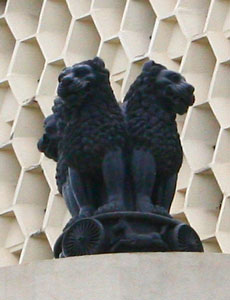service tax
The Supreme Court has directed the Delhi High Court to reach its final verdict quickly in the important matter concerning the levy of service tax on immovable property rentals by declining to stay the high court’s order in a special leave petition (SLP) filed by the Union Government.
 Economic Laws Practice (ELP) and Naik Paranjpe & Co have respectively represented Bollywood film studios PVR Pictures and Reliance Big Entertainment in filing a writ petition to challenge the imposition of service tax on copyright transfers, which was introduced by the Finance Act 2010 on 1 July 2010.
Economic Laws Practice (ELP) and Naik Paranjpe & Co have respectively represented Bollywood film studios PVR Pictures and Reliance Big Entertainment in filing a writ petition to challenge the imposition of service tax on copyright transfers, which was introduced by the Finance Act 2010 on 1 July 2010.
 The government post-budget notifications to tax new services and amend taxation of existing ones have taken effect today, particularly impacting sectors such as aviation, construction and hospital services while retrospective service tax imposition on rentals of immovable property and commercial coaching could increase litigation.
The government post-budget notifications to tax new services and amend taxation of existing ones have taken effect today, particularly impacting sectors such as aviation, construction and hospital services while retrospective service tax imposition on rentals of immovable property and commercial coaching could increase litigation.
In the case, the Society of Indian Law Firms (SILF) is taking the Government to court for putting law firms under the service tax regime.
These are SILF's grounds of the writ and the relief sought.
A: Service tax is a tax on "service" and not on the "service provider". As such, so long as the nature of "service" remains the same, the form or the business organisation of the service providers/recipient is completely irrelevant, immaterial and extraneous to the object and purpose of the Act.
B: The nature of service, provided and consumed by individuals on the one hand and firms/corporate/ associations on the other is the same, and as such there is no intelligible differential for the purported classification.
C: It appears that the purport of the impugned provision is to levy tax on Law Firms and Corporate Clients whilst excluding individual advocates and individual clients. Thus, the tax sought to be imposed is really a tax on the service provider/recipient and not on service, thus being violative of Article 19(1)(c) of Constitution of India.
D: The basis of classifying legal service providers/recipients into, two groups, viz. individuals and business entities, has no rational nexus/connection sought to be achieved by the Act.
E: The differentiation between "Law Firm" and an "individual" under the Impugned Provisions is arbitrary, unintelligible, unreasonable, discriminatory and has no rational nexus to the object sought to be achieved. Such a classification creates a hostile discrimination between advocates as a class in itself.
F: The levy of service tax on Law Firms is a restriction on the freedom of individual advocates to practice the profession of law by forming an association or partnership duly authorised by law as it imposes unreasonable conditions. The imposition of service tax would be a significant determent to advocates organising themselves into firms.
G: The purported classification of services into services rendered by way of appearance in Court and other services which are provided in aid thereof, is irrational, arbitrary and violative of Article 14 of the Constitution of India.
H: The Impugned Provisions of the Act are palpably irrational and arbitrary and deserve to be struck down.
I: The Impugned Provisions seek to levy service tax only on a part of the activities of a law firm in as much as it excludes from the scope of levy, services provided by way of appearances in courts and services of any kind provided to individuals. Under the CENVAT Credit Rules, 2004 Rule 6 permits availment of CENVAT credit only on inputs, capital goods and input services, only to the extent they are used for providing taxable output services. It provides for a mechanism by which the extent of credit can be availed by an output service provider.
J: A Law Firm is not a "business entity" and the Impugned Provision so far as it provides for inclusion of a Law Firm within the definition of "business entity" is illegal, arbitrary and bad in law.
PRAYERS SOUGHT:
a) issue a writ of mandamus declaring Section 65(105)(zzzzm) and Section 66 of the Act, as amended by the Finance (No.2) Act, 2009 in so far they provide for levy of service tax on law firms;
b) restraining the Respondents from implementing or taking any steps in furtherance of the 65(105)(zzzzm) and Section 66 of the Act;
c) pending the hearing and final disposal of the petition, restrain and prohibit the Respondents from implementing or taking any coercive steps or actions against the Petitioners.
 The Society of Indian Law Firms (SILF) has filed a writ in the Bombay High Court against the most recent Union Budget's service tax on law firms, contesting its rationality and constitutional grounds.
The Society of Indian Law Firms (SILF) has filed a writ in the Bombay High Court against the most recent Union Budget's service tax on law firms, contesting its rationality and constitutional grounds.
 Lawyers have threatened legal action over the Government's new service tax as Delhi litigators are going on strike over the issue today.
Lawyers have threatened legal action over the Government's new service tax as Delhi litigators are going on strike over the issue today.
 It turns out not all lawyers are against being charged service tax...
It turns out not all lawyers are against being charged service tax...
The Bar Council of India for one has come out in favour of the tax change that was introduced in Monday's budget, which meant that for the first time ever, Indian lawyers will be deemed to provide a service - something that clients will no doubt applaud after years of being palmed off with mere professional advice.
BCI chairman SNP Sinha told the Business Standard he thought it was a great idea that law firms would finally be taxed.
"The government of India has taken a wise decision by imposing tax," he said. "In the wake of the recently passed Limited Liability Partnership Act, foreign law firms are making (back-door) entry through joint ventures and collaboration. Thus they are justified in imposing tax."
Perhaps crucially, the tax change will not affect individual practitioners or those rendering services to - sorry, advising - individuals.
Unsurprisingly, the Society of Indian Law Firms (SILF) was not happy. The body's president Lalit Bhasin told the daily paper: "It is a (retrograde) step.
"Instead of helping, strengthening and promoting Indian law firms, the government is trying to substantially weaken them, and they are facing the threat of entry of foreign firms in the country."
Thanks to islandexpress who first tweeted the Business Standard article.
 The 2009-10 Union Budget has extended service tax to lawyers, which could directly increase legal bills to clients and result in downward pressure on fees.
The 2009-10 Union Budget has extended service tax to lawyers, which could directly increase legal bills to clients and result in downward pressure on fees.